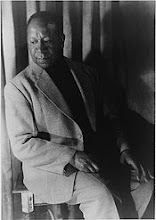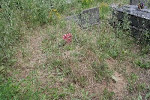In reference to Beauford's need for permanent care as a result of his declining physical and mental health, biographer David A. Leeming states in Amazing Grace: A Life of Beauford Delaney that "...temporary relief came in the person of the young painter Clarence Hagins, who visited Beauford in December and spent many days, including Christmas 1973, with him."
Les Amis is privileged to have Lucy Blue, a close friend of Hagins, share an intimate view of Hagins' relationship with Beauford in this blog post. (Read Blue's personal memories of Beauford here.)
Photo courtesy of Lucy Blue
Les Amis: Tell us what you know about Clarence Hagins’ relationship with Beauford.
LB: Clarence was finding his way as an artist and I think he was looking to Beauford as a kind of trailblazer. The following entries from Clarence Hagins’ journal and letters may shed more light on his relationship with Beauford Delaney.*
* * *
An entry from Clarence Hagins’ journal of 12/22/1973:
Later Lucy and I saw Beauford Delaney—as we sat there in his little studio—on the Left Bank—I felt no romanticism—only pain—He was very nice to us—keep explaining why he had no money. People write and talk about his work, but keep the money.
Later he said he knew Picasso—Showed Lucy and I [sic] a painting he had done of Picasso—that was very simple—He said Picasso was old but like a child—really—we eat bread and other food that fell on the floor of his strange little junky (?) studio floor. —
Portrait of Pablo Picasso
Oil on canvas
Private collection
© Estate of Beauford Delaney
by permission of Derek L. Spratley, Esquire,
Court Appointed Administrator
Image courtesy of Christian Parramon
An entry from Clarence Hagins’ journal of 12/26/1973:
Last night Lucy and I were at the Dôme—with Beauford Delaney—I gave the waiter a small sketch. We saw photographs on the walls—of Dufy—Dali—many other painters. Lucy made a beautiful drawing of Beauford also.
After having a glass of red wine for 4 Fr each—we left—went back to Beauford’s place on the Rue Vercingétorix, apt. # 38, House 53—a street few would care to live on. Beauford had told Lucy she was "deep in the kingdom"—so deep she did not realize how deep. "Deep down," he said with a smile as only Beauford can give.
I did not know just what he called the kingdom. But if it was to live with very little money as he, —eat the worst food as he, have teeth that were in great need of dental care, and shoes with yellow string in them to keep them on one’s feet—I felt I wanted to get to hell out of the kingdom and fast—
Beauford is a charming person to be with—his physical state is very—frightening—but he is full of laughter—but I could see the pain in his face, I can see it in his walk, but he gets along somehow.—How I don’t know? —He tells me of his money problems—but I can’t help him at this time. What can I say? What can I do?
Clarence N. Hagins
Image courtesy of Shirley B. Johnson-White
* * *
An entry from Clarence Hagins’ journal of 1/7/1974:
We went to another section of Paris looking for a bath house—we each could have used one—but the bath house was closed on Monday—Tuesday—and Wednesday—
Self-portrait in a Paris Bath House
(1971) Oil on canvas
Knoxville Museum of Art
Knoxville, TN
© Estate of Beauford Delaney
by permission of Derek L. Spratley, Esquire,
Court Appointed Administrator
From there we had hoped to go to Beauford Delaney’s place—but when we looked up Beauford was coming down the street—smiling as only Beauford can—(smile)—We three went to Le Dôme—had drinks—and returned to Beauford’s little place—
Beauford went on talking as he does—about people, not using any names—We talked of Picasso—not using his name. Beauford said he had met him many times in Paris. We had talked on and off about Jimmy.
* * *
An entry from Clarence Hagins’ journal of 1/31/1974:
Last Day in Paris
We walked into our French friend … —who was on his lunch hour. He said he would meet us at 7 p.m. in front of the Café Le Dôme.—Lucy and I went to find Beauford. We went to his house—but he was not home. We wanted to see him before going back—time was running out. Just as we were going to look for him—(walking fast we were)—he was coming toward us. The three of us left for the Café—met our friend and had dinner—
Later Lucy and I went back to Beauford’s—HE HAD NO LIGHTS. It was true. Life had gone from bad to worse—and Beauford so old, so lonely. He lit a candle—which was stuck in a bottle for us. There we were us three struggling around in the dark, Beauford trying to find a drawing to give each of us—things falling over—Beauford was suffering a kind of stress—and nervousness that I had started to know and understand…
* * *
An entry from Clarence Hagins’ journal of 1/31/1974, continued:
(in flight) Last day. …oh too well. —Seeing him struggle, talk to himself (as if we were not in the room with him)—He would say, "Oh no, not this one, I can’t give you that one.—Here, take this one—No—Give it back, I’ve got to show it."—On and on—like this Lucy lost faith—She could see how it was—the life of M. Artist—
He kept opening portfolios—one after the other, things falling on the floor, some drawing, 1940 or older, rags, hanging up, old rags on his bed, I was smoking. I came close to setting his bed on fire, it did catch. Lucy reached over and put it out—Beauford never saw it—
Oh God it was dark, we three could hardly see one another at times. People in the next building were making noise—Beauford would say—"Non, [?] stop, what’s that?—What they doing?"—Like some old Black man in Harlem who thinks people are fighting next door. He gave me another drawing, no, it’s the same one he gave me three times before and took back.—
Poor Lucy could not cope with his "yes, no, maybe so"—I could see she had given up—was I like this? Somewhat? Would I get more like this later? When approached by a friend for a drawing? Would the world keep me where they have always kept Beauford in "'Darkness'"—
Anyway Beauford had one little closet he kept looking in as if to find something—one of the two chairs were falling apart—as the three of us rotated from one to the other. He gave me the same drawing once again. This time I looked at it and I realized it was a man sweeping the street—a Black man sweeping a Paris street. At first the composition looked like a lot of lines drooped down—but when you see the man once, you see him forever sweeping.—
Street Sweeper (Le Balayeur)
(1968) Oil on canvas
Photo courtesy of Swann Galleries
© Estate of Beauford Delaney
by permission of Derek L. Spratley, Esquire,
Court Appointed Administrator
Time was running out. It was going on 10:00 p.m. and we had to go—so we could get some rest—Beauford said, "You are going tomorrow to America." —"Yes, Beauford." "How are you going, by boat? By train?" — "By plane." "What plane?" And he went on—"Now where did I put it?"
He looked up and said, "You know, it’s amazing. Tomorrow night this time you will be in America."—He gave us both a smile—the Beauford smile. His face looked somewhat like a child’s—we embraced him at the top of his stairs—He went in—his lonely Paris atelier—we went down. One could hear the door close behind us—I did all I could to hold back the tears.
Life had not been fair to him. His quest had not just been that of an artist, but that of a warm human who wanted to live a life worth living. And as he expressed to Lucy and I so sadly, "They come and they steal my drawings and things, I don’t know what I’ve got left." (OH GOD, I am crying and flying.) Perhaps it’s best I stop here.—
Lucy completed one last letter for me. Somehow we found a taxi. We took the train to the airport. I never like to say goodbye—because I realize with each goodbye—one moves closer to the time and place—where one has to say in every tongue at once the last and final—goodbye.
Amen.*Clarence Hagins' journal entries are reproduced here with the permission of his niece, Shirley B. Johnson-White.
Clarence Hagins Jan. 31, 1974.









No comments:
Post a Comment